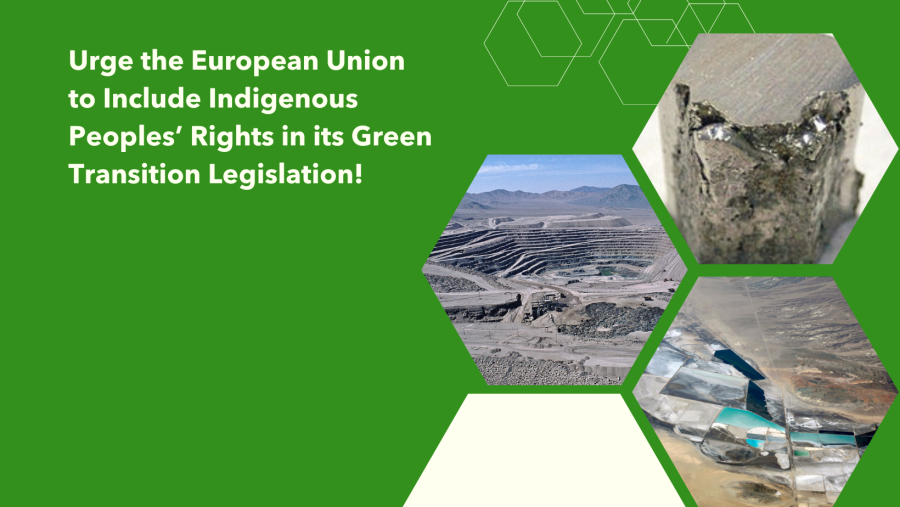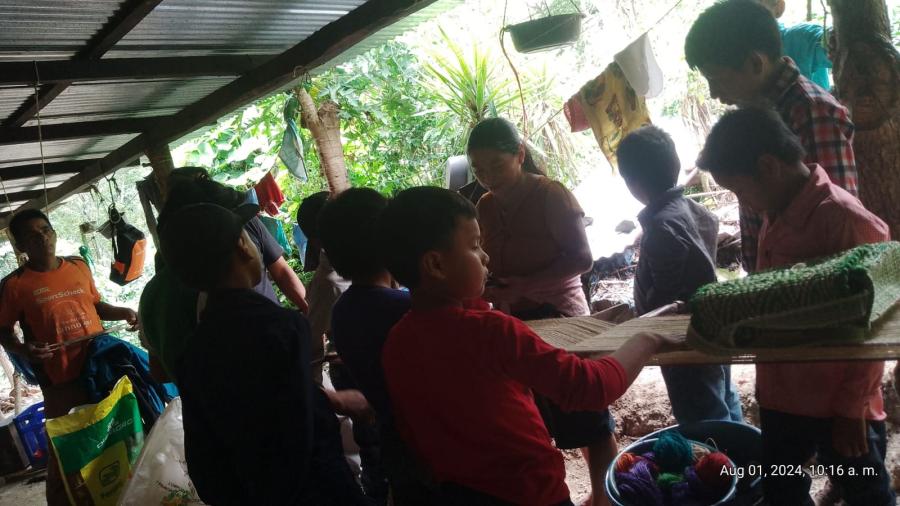
In 1990, the UN Global Consultation on the Right to Development declared that “the most destructive and prevalent abuses of Indigenous rights are the direct consequences of development strategies that fail to respect their fundamental right of selfdetermination.” Twenty-five years later, notwithstanding historic progress in the recognition of Indigenous Peoples’ rights in the international arena (most notably the adoption of the UN Declaration on the Rights of Indigenous Peoples), this statement still defines the reality for the majority of Indigenous Peoples.
Today, the survival of Indigenous Peoples around the world continues to be threatened by corporate activity. This includes mining, oil drilling, damming, deforestation, toxic pesticides, proliferation by agribusiness, water privatization and appropriation, and a range of other activities carried out on or near Indigenous Peoples’ lands without their Free, Prior and Informed Consent. These activities are often undertaken in violation of legally binding treaties and agreements. They desecrate sacred places, undermine food sovereignty and traditional livelihoods, and jeopardize community and reproductive health with little regard for violations of these and other individual and collective human rights of Indigenous Peoples.
The International Indian Treaty Council (IITC) and other Indigenous organizations are engaged in the work of Special Representative John Ruggie, who was appointed by the UN Secretary General “to identify and clarify standards of corporate responsibility and accountability for transnational corporations and other business enterprises with regard to human rights.” IITC has made several submissions urging the full and effective participation of Indigenous Peoples to ensure that their perspectives and experiences would be taken into account. IITC has also consistently underscored the vital importance of the Declaration as a framework for upholding Indigenous rights.
In June 2011 the Human Rights Council adopted a resolution unanimously endorsing the Guiding Principles on Business and Human Rights implementing the UN “Protect, Respect and Remedy” framework proposed by Ruggie. This framework provided a global standard for preventing human rights impacts of business activity and providing remedies for victims. The Guiding Principles are organized under three pillars: the State’s duty to protect human rights; corporate responsibility to respect human rights; and the need for greater access to remedy for victims of business-related abuse.
The UNWorking Group
In addition to adopting the Guiding Principles, the Human Rights Council established a UN Working Group on the issue of human rights and transnational corporations and other business enterprises to carry out studies and oversee implementation at the country level. Along with issue-based studies and country visits, the Working Group organizes annual Human Rights and Business Forums where States, UN agencies, NGOs, and Indigenous Peoples review good (and bad) practices, present strategies for effective implementation, and highlight areas of ongoing concern.
The responsibility of States to be accountable for human rights violations caused by the corporations they license and the duty of corporations to respect human rights are relatively new and evolving human rights concepts. However, even before the Guiding Principles on Business and Human Rights were adopted in 2011, the UN Committee on the Elimination of Racial Discrimination, the treaty monitoring body for the international convention of the same name, affirmed that both Canada and the United States are obligated to prevent human rights violations in Indigenous communities around the world by corporations licensed in either country. The continued lack of compliance by the US with this recommendation from the Committee was addressed when the US was reviewed again in 2013. The Committee made similar observations addressing the responsibility of Canada, in particular regarding the activities of Canadian mining companies carrying out activities that violated the rights of Indigenous Peoples outside the country in both 2007 and 2012.
Indigenous Peoples’ Participation in UN Forums on Business and Human Rights
From its first session in 2012, the UN Forum on Business and Human Rights has recognized that Indigenous Peoples around the world suffer from adverse impacts of corporate activity resulting in violation of a wide range of their individual and collective rights. At all three sessions of the Forum to date, Indigenous Peoples have been a key focus, although there is still no formal mechanism or permanent agenda item, as requested by Indigenous Peoples, to ensure their formal participation and full inclusion in future sessions. Chief Wilton Littlechild, Chair of the UN Expert Mechanism on the Rights of Indigenous Peoples addressed the first session in 2012, and the UN Special Rapporteurs on the Rights of Indigenous Peoples, James Anaya and Victoria Tauli-Corpuz, were panelists at the second and third sessions. One of the Working Group’s first activities was a groundbreaking study exploring the challenges faced in addressing “adverse impacts of business-related activities on the rights of Indigenous Peoples through the lens of the United Nations Guiding Principles on Business and Human Rights.”
Specific concerns raised by IITC at the third Annual Forum on Business and Human Rights held December 1–3, 2014 in Geneva, Switzerland, focused on the continued production and export by US corporations of highly restricted and unregulated pesticides banned for use in the US. This practice, permitted by current US laws, has had devastating, well-documented human rights consequences, including undermining reproductive health and causing over 25 documented deaths in Yaqui Indian communities in northern Mexico. IITC presented this concern in a side event organized by the UN Committee on the Rights of the Child, and was invited to submit this issue for the Committee’s country review of Mexico in May 2015.
The United States’ National Action Plan
A key mechanism for implementation and a central focus of discussion at the most recent Forum is the development of National Action Plans by UN member states to promote implementation of the Guiding Principles. On January 14, IITC sent a written contribution to the US State Department for the development of its own National Action Plan, which was announced by President Obama in September 2014. It is targeted for completion, after a series of consultations around the country, by the end of 2015. The first consultation was held in New York City on December 15; upcoming sessions are planned for Oklahoma, California, and Washington, D.C. in February and March 2015.
IITC’s submission followed up on issues raised during reviews of the US in 2014 highlighting corporate activities impacting the rights of Indigenous Peoples in and out of the country. These include laws allowing the manufacture and export of pesticides from the US that have been banned or deregulated in the US; violations resulting from corporate activities that cause the destruction, desecration, and contamination of Indigenous Peoples’ sacred and ceremonial sites, areas, and landscapes, including many located on what are now federal lands and in areas recognized as belonging to Indigenous nations under their ratified Treaties with the US; and lack of US compliance and implementation of the provisions and rights affirmed in its human rights obligations and commitments.
World Conference on Indigenous Peoples
The Outcome Document of the High Level Meeting of the UN General Assembly, also known as the World Conference on Indigenous Peoples, further underscored UN member states’ commitments to uphold the rights affirmed in the Declaration. The Outcome Document adopted on September 22, 2014, included a commitment to the right to Free, Prior and Informed Consent related to development activities. Based on the UN Guiding Principles Business and Human Rights, as well as the Concluding Observations of UN Treaty Bodies and the commitments made by States (including the US) in the outcome document, IITC made several recommendations to the US State Department urging the use of rights affirmed in the Declaration, the International Covenant on Civil and Political Rights, and the International Convention on the Elimination of All Forms of Racial Discrimination.
IITC also urged that the national action plan affirm the rights contained in the World Conference outcome document to Free, Prior and Informed Consent; that the plan uphold the rights affirmed in the nation-to-nation treaties it concluded with Indigenous nations to interpret and guide its implementation of the UN Principles on Human Rights and Business; that it incorporate and implement the recommendations of the Convention on the Elimination of Racial Discrimination and Covenant on Civil and Political Rights treaty bodies with regard to the protection of Indigenous Peoples’ sacred areas, sites, and landscapes; and that it include a commitment to take immediate steps to halt the production and export of pesticides and other toxic chemicals that have been banned for use in the United States.
Although these recommendations are directed specifically to the US, similar recommendations can be made to other member states where corporate and business activities impact the rights and survival of Indigenous Peoples. The devastating effects of business and corporate activities upon the rights of Indigenous Peoples, their health, lands and territories, cultures, and ways of life, cannot be minimized. Neither can the responsibility or accountability of member states.
—Andrea Carmen is the executive director of International Indian Treaty Council, an Indigenous Peoples organization with General Consultative Status with the UN Economic and Social Council.
Read the UN Guiding Principles on Business and Human Rights here: goo.gl/vAQgf4.
read the un guiding principles on Business and human right



